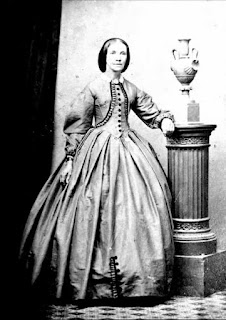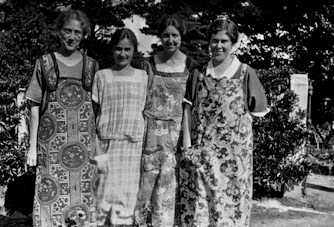21/52 Conflict Mary Wibberley 1921 -2014
Conflict: Mary Wibberley 1921 - 2014
I begin with trepidation. If only I had been able to find a woman ancestor who had been involved in a war. But so far as I know, they kept the home fires burning, knitted socks and wrote letters to their lovers and brothers at war.
My mother, Mary Wibberley, experienced conflict in her marriage to my father. I’m pretty sure she wasn’t the only woman ancestor in the family to have that experience. In her case though, there was a separation and a divorce and I was in the thick of it. It couldn’t be shoved under the carpet. She probably would have preferred to have done this but it became impossible.
Hermia Mary Wibberley was born in May, 1921 in the farming/fishing village of Tumby Bay. Her name ‘Hermia’ was a reference to Midsummer Night’s Dream. In the Sparknotes study guide to this play it says:
Hermia is one of the strongest female characters in the play. She passionately rejects male authority figures in order to make a powerful claim for her own “sovereignty” in the realm of love.
She was fittingly named although she was always called Mary.
She was the first, most eagerly awaited child of Bill and Marge Wibberley. Bill had been away at the Western Front form 1915 to 1919 and they had waited to get married in 1920, writing romantic letters, sharing a love of literature. You can imagine the discussions that took place as they chose this name, ‘Hermia’. He a country doctor and Margery a socially active, educated and loving mother, Mary had an idyllic childhood. She got sand between her toes, learned to play the piano, bossed her younger brother, Brian and was introduced to children’s literature, girl guides, gymnastics. She excelled at school in Tumby Bay, appearing every year in the Honor’s Lists. In 1934, aged 13, she was sent to board at Methodist Ladies College in Adelaide where she cried every day for the first week from homesickness. . Here she continued to excel academically and also musically. When she was awarded DUX of the school in 1938 she must have felt the world was at her feet.
Some time in her University years Mary was diagnosed with TB. She was sent to Tasmania to stay with her mother’s great friend, Elve Glasson, to recuperate. During that time she got to know Elve’s son, John and their engagement was announced in June, 1940. He was training in the Merchant Navy in England. Mary finished her university degree and started teaching Latin at MLC in 1943. In 1944 John Glasson was killed ‘due to enemy action’. It was the second time the Glassons and Mary’s family had tried to unite in marriage - Mary’s aunt, Mary Godlee, had been engaged to John Glasson’s uncle who had been killed in the first world war. We always wonder how things would have been different but we always arrive back at: if Mary had married John Glasson, we would’t be here.
Mary was teaching at MLC with Grace Jackson. Grace introduced Mary to her brother, Ted and in September 1946 they announced their engagement. Ted had been away in the Northern Territory during the war, serving as a signal man. He came from a very different kind of world. He had left school at 14, and worked as a roustabout on farms, sleeping rough, badly treated. The war gave him an avenue to education and he studied by correspondence while he was posted in the NT. When he got home to Adelaide after the war his service enabled him to enrol at university in Agricultural Science.
Their first home was an architect designed modern house in Burnside. Across the road was a paddock of cattle, down the road a creek. 25 Lockwood Avenue featured in Home Beautiful. My two sisters and I were all born here. It was probably a happy time. I know it was for me.
The conflict in their marriage was not overt. In those days, as our ancestors had done for generations, they kept a stiff upper lip, didn’t air the dirty washing, kept their feelings unfelt, swallowed them down. So I don’t know when the problems that later blew out so publicly began. I suspect it was fairly early on.
Ted might have felt intimidated by Mary and her family. There was a class difference. Ted’s mother had been a domestic servant and his father a socialist chauffeur. Ted’s sister, Florence, used to say that Ted had been damaged by the war. He never spoke about the war, except to reassure me as a child when I was scared at night. He used to tell me that he had learned to listen intently for the enemy and if there was any bad men sneaking around the house, he would know. So perhaps he did suffer Post Traumatic Stress Disorder and was hyper vigilant. He had a restlessness. He moved jobs, moved house and I learned later he was never sexually faithful to Mary.
In 1957 he took a job in Alice Springs and we moved there. Mary was at home with the baby, Penny, while Libby and I went to school. Both Ted and Mary were active in the community, starting the Alice Springs Film Society and Mary was active mother in the P&F. at the school. She missed her family and hated the heat and the dust.
In 1960 we moved to Melbourne. In these years I remember my parents behaving lovingly towards each other. But there was something about the culture of the 1960s, before hippies and free love, where men took an attitude of entitlement to sexual freedom. Perhaps it was a feature of left wing intellectualism, expressed by the likes of Jean Paul Sartre and Norman Mailer. Mary had to put up with it. She loved Ted unconditionally and that was that. She believed he loved her and that he would have a fling and then return to her. She swallowed it down.
So it went on until the mid 60s when Ted, now 40, took up with Judy, twenty years younger than him and wasn’t prepared to give her up. There followed several years of intense unhappiness which Mary tried to hide from us. I knew nothing about the forces that were driving our family’s movements over those years, although I had a guilty feeling in my gut, a nameless fear. He took a job in the Philippines, and the house was put on the market. Then on the day of the auction, it was withdrawn. Ted went to the Philippines without us. Mary wouldn’t sell up and leave her job and move if he was still having this affair. He told her it was over and we moved to the Philippines. But it wasn’t over. We left him there and returned to our house in Melbourne which had not been sold. The next year he returned and they tried to have an open marriage where he would spend four days with us and three days with Judy, his young lover. He told us he was working up the country. Except one day I went past his work, on the bus, and saw his car parked there, when he should have been up the county.
Eventually in the end of 1967, Mary couldn’t do it any more. I was summoned to the bedroom and told that Dad would be leaving. The family was too restrictive to him, it was explained to me.
He went to live in a flat in Camberwell and after a while Judy moved in. I started to put the story together but it wasn’t until the end of 1968 that I was told the whole sordid story: how Ted had never been faithful to Mary; that she had put up and shut up through all their marriage. Mary was intensely unhappy and I could now empathise with her. It was my idea that we move to Adelaide where she could be supported by her family. My father never forgave me, the 15 year old, for promoting that idea. Perhaps it went both ways: I didn’t forgive the adult father for treating my mother so badly.
Mary bought a house in Adelaide and my younger sister and I went to live with her there. She started to pick up her life.
Mary spent the next 40 years in Adelaide, twice as long as she had been married to Ted. She and Ted remained friends. They visited one another, celebrated birthdays and Christmas, wrote to each other and continued a relationship of sorts. When Ted got dementia in old age, he forgot that he wasn’t married to Mary.
The failure of my parents marriage is complex. I blamed dad but Mary was a privileged oldest child of a middle class family who had always had it her way. She was bossy and controlling. Ted, from a migrant working class family, was the youngest who had been bossed all his life by his older sisters and then in the army.
There was conflict in their marriage although they didn’t yell and throw plates. He managed his feelings with alcohol. Mary dealt with her sadness with anti-depressants. In a way they were victims of war: Mary should have married John Glasson and Ted was damaged by spending his early twenties in the army.. Big international conflicts send waves spiralling out to take in families for generations.
This has been difficult to write because, sixty years later, it is still close. Take me back to my great greats.





Very brave of you to share this. Thank you for the insight into your world. You clearly sympathise with both parents and have achieved some degree of peace with your past. Julie xox
ReplyDeleteThank you Julie.
Delete